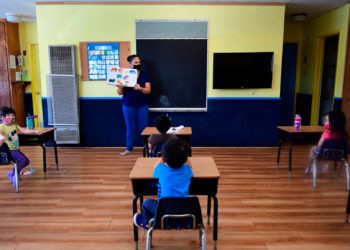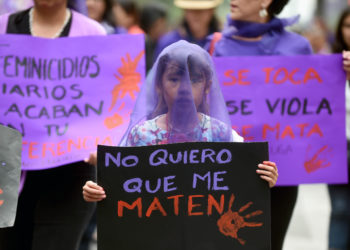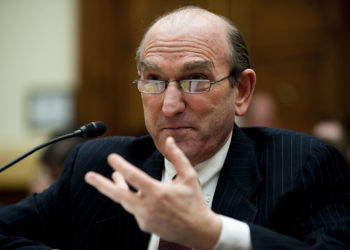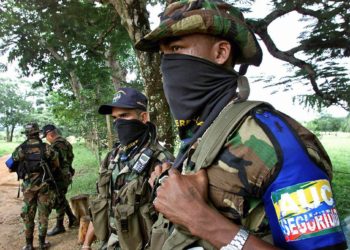Luis Acosta talks softly but carries a big stick – it’s the way of the jungle paths of his native Colombia – and though his word holds weight in his indigenous community, his stick, a tasseled staff, is purely symbolic.
Acosta is coordinator of the national guard, the authority responsible for security in indigenous territory across Colombia, but his men are fighting a losing battle against the country’s armed groups.
At a time when attacks on indigenous people are increasing, Acosta used a recent gathering of his guards to urge them to fulfill their duty to protect their communities.
“Our fundamental weapon is spiritual strength,” he told AFP. “Our staffs are loaded with spiritual strength.”
Weary from the violence, 1,500 guardsmen from half-a-dozen communities gathered at the weekend in Toribio, in the troubled southwestern department of Cauca, to coordinate self-protection.
Power Vacuum
Marxist FARC guerrillas disarmed under a 2016 peace agreement that brought only temporary respite to this overwhelmingly indigenous municipality of 29,000 people.
The group was founded in 1964 around a platform of agrarianism and anti-imperialism and has clashed with the government and right-wing paramilitaries over the decades since.
As in other areas of the country, FARC’s disarmament left a vacuum over which other groups – dissident FARC guerrillas, ELN rebels and drug-trafficking gangs – are fighting a turf war.
Caught in the middle, the local communities are paying a heavy price.
“Under the noses of the army and the police, they are assassinating our people,” said Jairo Enrique Narvaez, coordinator of the Yanacona tribe.
“We feel really helpless. We are people of peace and we fight, not with weapons, but with our ideologies.”
Since the signing of the peace agreement, 486 community leaders, human rights defenders and environmental activists have been murdered, most of them in Cauca.
Among them were 31 people from indigenous communities, according to the ombudsman’s office.
During the five weeks from September 1 to October 7, the U.N. High Commissioner for Human Rights (UNHCR) recorded nine murders of indigenous people in Cauca.
It also reported an increase in cases of torture, forced recruitment of minors, displacement of populations and attacks.
Toribio is surrounded by the emerald green of the Andes foothills, on whose slopes flourish marijuana and coca plantations. The area has suffered more than its share of bloody gunbattles between the armed forces and FARC guerrillas.
In Toribio, the guards marched quietly brandishing their staffs over their heads or holding them tight across their torsos, symbolizing their role as defenders of their communities.
Their strategy is low key, but the community defenders say they face armed men seeking to recruit indigenous villagers or move them off prime land so they can plant coca.
Sometimes they manage to negotiate the release of a young person conscripted by the armed groups, or even to capture or disarm some gunmen.
But these victories are few and far between, and only seem to amplify the threat from the armed groups, who act with impunity in an area where the influence of the state is weak or non-existent.
“The concern is huge, they fire on us directly,” said Jorge Urwe, who came from the north of Cauca, speaking of FARC dissidents who are gaining ground in Cauca.
“We will not let ourselves be bullied,” he said.
Unequal Fight
It’s an unequal fight between guns and the staffs which are symbols of honor for the indigenous groups, who represent 4.4 percent of Colombia’s 48 million people.
Carved from chonta wood, the staffs are decorated with animal carvings or colored ribbons, depending on ethnicity.
Around 80 centimeters (two-and-a-half feet) long, the staff “is the companion who accompanies us in the exercise of territorial defense,” said Jose Albeiro Camallo, a 39-year-old guard.
“Our elders always tell us: if you have a weapon you have two options, kill or let yourself be killed. We have said we are not going to kill anyone,” said Camallo.
“That would not be a balance for us.”
Although all too conscious of the unequal fight, the indigenous groups reaffirmed their willingness to keep up “a peaceful resistance.”
Acosta, the man they all listen to, said: “We are ready to give our lives to defend life itself.”
More on the Subject
Thousands of Brazilian Indigenous Women Protest Bolsonaro’s ‘Genocidal Policies’
























